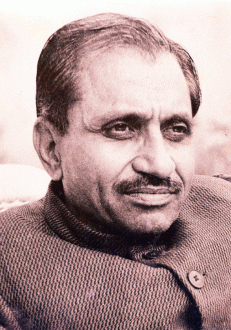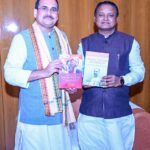THE PANDIT THAT INDIA FORGOT
- By : Anirban Ganguly
- Category : Articles

Pandit Deendayal Upadhyaya established and spread the Bharatiya Jana Sangh across the country. In shaping post-independent India’s political evolution and in imparting it a distinct direction, his contribution has, perhaps, been unparalleled and epochal
September this year announces the centenary of Pandit Deendayal Upadhyaya, the one leader who, after Syama Prasad Mookerjee, guided, established and spread the Bharatiya Jana Sangh and its vision and ideals across the breadth of India. In shaping post-independent India’s political evolution and in imparting it a distinct direction, Pandit Upadhyaya’s contribution has, perhaps been unparalleled and epochal. Yet, had it not been for the political party he worked to establish in India’s national life or for the Rashtriya Swayamsevak Sangh, to whose vision he dedicated himself early in life to organise and re-vitalise the Bharatiya samaj, Pandit Upadhyaya would have been largely forgotten, throttled under the multiple narratives that celebrated the one ‘Pandit’, who dominated Indian politics post-independence and whose legacy has been officially celebrated and patronised for decades.
Here was a political-philosopher, who brought back into the Indian public life and public lexicon, the words that described the nation as a pulsating entity — an entity which possessed an identity-soul — chitiand whose frame was infused with virat, like the physical body was infused with prana. Just as prana infuses strength in various organs of the body, refreshes the intellect, and keeps body and soul together, pointed out Upadhyaya, “so also in a nation, with a strong virat alone, can democracy succeed and Government be effective.” Such articulations brought back into post-independent Indian polity, a tone that was in consonance with her intrinsic civilisational temper and worldview.
By shaping a political philosophy that was essentially a quest to evolve a political framework and movement inspired by the Bharatiya civilisational ethos, Pandit Upadhyaya unleashed the possibilities of evolving a political discourse that was inspired by indigenous thought-roots of India. Unlike other political ideologies which had no roots in the Indian thought-evolution and which derived inspiration primarily from foreign frameworks and paradigms, the vision of integral humanism, as propounded by Pandit Upadhyaya, sprung from the fountains of Bharatiya thought and aspirations. Post-independence, when models for India were being volubly debated, when an attitude of importing and grafting into Indian conditions models that were predominantly experimented upon in the West dominated, Pandit Upadhyaya displayed a spirit that was not overawed by the achievements or dominance of the West.
Instead, he chose to question, examine, evaluate and weigh the viability, the success and the shortcomings of each proposition. He was not, as some have preposterously and hurriedly argued, opposed to Western science and instead pointed out like many of his ideological and spiritual colleagues and mentors from the RSS, that while Western science was universal and needed to be absorbed if one were to move forward, the same could not be said to be true of the Western way of life and of its values.
Pandit Upadhyaya refused to equate modernisation with Westernisation and in that, he was way ahead of his times and of the period when societies across the world would increasingly look to going back to their roots of identity which had seen gradual dilution due to a process of ‘modernisation’ read ‘Westernisation.’
Pandit Upadhyaya spoke of dharma rajya, as a state, where inequality and divisiveness was eradicated. An economic system and a Government must be able to provide food, clothing and shelter and must “enable the individual to carry out his obligations to society by properly educating him” and in the event of “an individual falling prey to any disease, society must arrange for his treatment and maintenance” he argued. For him, a Government which was concerned with these was a Government which worked out the rule of dharma – otherwise it reflected the rule of adharma. Pandit Upadhyaya argued basing himself on the Indian civilisational vision and framework of governance that “Being responsible for the maintenance, protection and education of his subjects”, the ruler was their true father.
The need for India to evolve her own understanding of the world, the need for her to rediscover her cultural and civilisational roots and to understand the essential shape and expression of her identity and to re-state it in the current context were issues that Pandit Upadhyaya advocated as he advocated the need to develop our own technologies suited to our societal conditions and achieve technological and industrial self-sufficiency, self-reliance in energy and the need to explore options of energy and power generation.
He spoke for the marginalised, for the traditional and indigenous landholders, for the farmers and for those who still stood on the last rung of the societal ladder and who needed support and an enabling environment. At the same, anticipating a debate that would gather steam only a decade after he was dead, Pandit Upadhyaya cautioned against an increasing habit of resorting to an “eco-destructive consumerism” and called for the need to evolve or re-discover the fundamental balance between nature and man — a balance that had been stipulated and enjoined by India’s civilisational thought leaders from across the ages. Long before debates on sustainable development had gained momentum, Pandit Upadhyaya, in a sense, pointed to the need for focusing rather on “sustainable consumption.”
Pandit Upadhayay’s entire political career spanned the era of the Cold War and the fierce division of the world into ideological and economic blocks. Yet, he refused to be swayed or side with any of these, not in a spirit of an ambivalent non-alignment but rather inspired by the urge to see India genuinely independent and self-reliant. In the early 1960s, India faced her PL 480 phase, primarily because those philosophers and moralist who ruled her post-independence, largely ignored the need to enhance her agricultural production. The easiest course of action was for the then Indian leadership to appeal to the West to pour the spill-over of its own production on to the Indian bowl.
While the then (1960) Food Minister of India, the formidable SK Patil, prided himself on striking a great deal with the Americans on the supply of wheat, Pandit Upadhyaya argued that “while these imports may help us tide our present difficulties, the real solution to the problem” lay in “maximising agricultural production in the country.”
Writing his political diary, Pandit Upadhyaya argued that what we want is “our freedom and our food” and that was possible only if we worked for “freedom from foreign food.” The same spirit of independence and national self-reliance was displayed when he called for defence preparedness as well as defence self-sufficiency and called for a foreign policy that “should be framed with the sole objective of securing the enlightened self-interests of the nation” and to be realistic and take into account the “mundane nature of the world”, in short, esoteric formulations and shallow sentimentalism had no role while charting the course for pursuing India’s national interest on the world scene.
It was Pandit Upadhayay’s pragmatism that was in sharp contrast to the wooliness of the public policies of the period. He cautioned against excessive philosophising and conservatism when he wrote that “We have set out with the determination to make this nation strong, happy and prosperous…and, therefore, we must carry on practical programmes for national reconstruction on this foundation…Our goal is not merely to protect the culture but to re-vitalise it so as to make it dynamic and in tune with times. We must ensure that our nation stands firm on this foundation and our society is enabled to live a healthy, progressive and purposeful life.” And in pursuance of this supreme national objective, if need be, argued Pandit Upadhyaya, “we shall have to end a number of traditions and set in reforms which are helpful in the development of values and of national unity in our society. We shall remove those traditions that obstruct this process.”
The re-emergence of drasthas — creative thinkers or visionaries — in the Bharatiya tradition is an imperative for a civilisational renewal — for our times, Pandit Deendayal Upadhyaya has clearly emerged as one such drashta — a visionary who envisioned and anticipated an entire epoch.

















